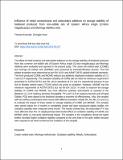| dc.description.abstract | The effect of metal contents and antioxidant additives on the storage stability of biodiesel produced from less common non-edible oils of Eastern Africa origin (Croton megalocarpus and Moringa oleifera) were evaluated and reported in the present study. The croton oil methyl ester (COME) and moringa oil methyl ester (MOME) were produced by transesterification process. The fuel related properties were determined as per EN 14214 and ASMT D6751 global biodiesel standards. The fresh produced COME and MOME without any additives displayed oxidation stability of 2.5 h and 5.3 h respectively. The oxidation stability of COME did not meet the minimum requirement prescribed in ASTM D6751 and EN 14214 standards of 3 h and 6 h respectively because it was rich in linoleic methyl esters (70.5%) which are prone to oxidation. However, MOME met the minimum requirement of ASTM D6751 but not the EN 14214. In order to improve the storage stability of COME and MOME, two most effective synthetic antioxidants as reported in the literature (1,2,3 tri-hydroxy benzene (Pyrogallol, PY) and 3,4,5-tri hydroxy benzoic acid (Propyl Gallate, PG)) were doped to the biodiesel samples to examine its effectiveness. Also, the samples with and without antioxidant were mixed with different transition metals (Fe, Ni, Mn, Co and Cu) to evaluate the impact of these metals on storage stability of COME and MOME. The samples were stored indoor for 6 months in completely closed and open translucent plastic bottles, the oxidation stability were measured every month. The results showed that, the antioxidant PY was more effective than PG. Fe displayed least detrimental effect on oxidation stability of COME and MOME while Cu had great detrimental impact. The samples in the completely closed (air-tight) bottles recorded higher oxidation stability compared to the ones kept in the open bottles because were exposed to air which enhanced the oxidation of the samples. | en_US |

